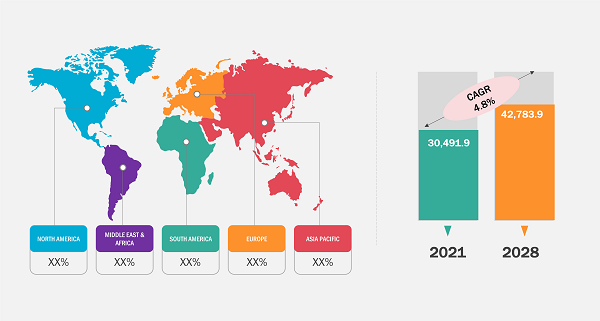Increasing Government Initiatives to Curb Growing Population Drives Women Healthcare market
According to our latest study on "Women Healthcare Market Forecast to 2028 – COVID-19 Impact and Global Analysis – by Drug, Application, and Geography," the market was valued at US$ 30.5 billion in 2021 and is likely to reach US$ 42.8 billion by 2028; it is expected to grow at a CAGR of 4.8% from 2022 to 2028.

Women Healthcare Market Size, Share & Growth Report 2031
Download Free SampleWomen Healthcare Market Size and Forecasts (2021 - 2031), Global and Regional Share, Trends, and Growth Opportunity Analysis Report Coverage: By Drug (EVISTA, XGEVA, Prolia, Mirena, Zometa, Reclast/Aclasta, and Others), Application (Hormonal Infertility, Postmenopausal Osteoporosis, Endometriosis, Contraceptives, Menopause, and Others), and Geography (North America, Europe, Asia Pacific, and South and Central America)
Source: The Insight Partners Analysis
The small and big companies operating in the women healthcare market are adopting various strategies, including regional expansion and technological advancements, to increase their market share. Growing incidence of chronic health conditions among women, rising government initiatives to restrain population growth, and increasing demand for contraceptives to control unintended pregnancies are other factors propelling the market growth. Moreover, key players' growing focus on R&D for developing advanced products is a significant market driver. Long-term extreme adverse effects of oral contraceptive pills, such as stroke, decreased libido, blood clots, vaginal discharge, and augmented risk of breast cancer, may limit usage and lead to restrictions by regulatory agencies. Such factors may hinder the market growth during the forecast period.
Women's health directs to the branch of medicine that focuses on treating and diagnosing diseases and conditions affecting women's physical and emotional well-being. Women usually experience unique health care challenges and are more likely to be diagnosed with certain diseases than men. Chronic diseases and conditions such as heart disease, cancer, and diabetes are the leading causes of death among women. Other health concerns impacting women include maternal health issues, urinary tract infections, sexual health, and osteoporosis.
The government across all regions are taking several steps to sensitize people and generate awareness of the need for population control. For instance, some important initiatives taken by the Government of India are Mission ParivarVikas, Redesigned Contraceptive Packaging, Clinical Outreach Teams (COT) Scheme, and National Family Planning Indemnity Scheme (NFPIS), among others. The country is planning to replace level fertility and achieve a total fertility rate (TFR) of 2.1 by 2025. Additionally, the US government has supported global family planning and reproductive health (FP/RH) efforts for over 50 years and is the largest donor to FP/RH worldwide. It is also one of the largest purchasers and distributors of contraceptives internationally. In 2020, US funding for family planning and reproductive health (FP/RH) totaled US$ 608 million, including funding for the United Nations Population Fund (UNFPA), up from the US$ 425 million in FY 2006.
According to the World Health Organization (WHO), as of August 2022, there were 596,873,121 confirmed cases of COVID-19 and 6,459,684 deaths. The highest number of deaths was in the Americas, followed by Europe and Southeast Asia. Due to economic uncertainty caused by COVID-19, limited transit options and travel limitations created impediments to international trade and transportation, affecting the supply chain for women's health diagnostics and temporarily lowering demand. The COVID-19 pandemic disrupted the supply chain of contraceptives, thus affecting sexual and reproductive health services. Also, due to COVID-19, several health services was forced to suspended or postponed. Thus, during the initial days, the COVID-19 pandemic had a negative impact on the women healthcare market.
Key players involved in the women healthcare market are undertaking initiatives to extend their product portfolios and strengthen their market position. For instance, in May 2022, Emcure, FOGSI launched an awareness campaign, “EmWocal,” on women's health in association with the Federation of Obstetrics and Gynaecologists of India (FOGSI). The initiative was live at 8000 clinics, presented in nine languages across India, and aimed to reach one crore women. Additionally, in April 2018, Mylan N.V. announced the US launch of Drospirenone and Ethinyl Estradiol tablets, a generic version of Bayer's Yaz Tablets. This product is indicated for use by women to prevent pregnancy and for the treatment of acne vulgaris in women at least 14 years of age who have achieved menarche and desire an oral contraceptive for birth control.
Bayer AG, Allergan plc, Merck & Co., Pfizer Inc., Amgen Inc., Agile Therapeutics Inc., Ferring Pharmaceuticals, Mylan N.V., Lupin Limited, and Blairex Laboratories are among the key players profiled during the study of the women healthcare market. Several other major companies were studied and analyzed during this research study to get a holistic view of the market and its ecosystem.
Contact Us
Phone: +1-646-491-9876
Email Id: sales@theinsightpartners.com